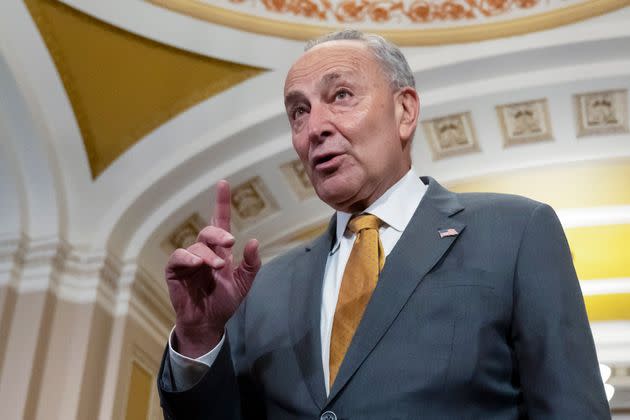Congress Is Up Against The Clock To Keep The Government Open
- Oops!Something went wrong.Please try again later.
Hopes of keeping the federal government funded past Sept. 30 now rest on a Senate bill unveiled Tuesday. But between House Republican leaders signaling no interest in it and the Senate’s own procedural vagaries, it’s questionable whether it can pass in time.
“While for sure this bill does not have everything either side wants, it will continue to fund the government at present levels while maintaining our commitment to Ukraine’s security and humanitarian needs, while also ensuring those impacted by natural disasters across the country begin to get the resources they need,” Senate Majority Leader Chuck Schumer (D-N.Y.) said.
The bill would keep the government funded at current levels through Nov. 17, provide $6.1 billion in military and economic aid to Ukraine and $6 billion for the Federal Emergency Management Agency’s pot for disaster response, and extend the authorization or funding for some programs that would otherwise lapse, such as cash welfare assistance, FAA programs, the Women, Infants and Children food aid program and federal flood insurance.
Sen. Mitch McConnell (R-Ky.), the leader of the Senate’s Republicans, was on board with the stopgap plan, saying it would give lawmakers more time to haggle out funding on other issues, like border security.
“The sooner Congress keeps the light on, the sooner these important conversations can resume,” he said.
But over in the House, House Speaker Kevin McCarthy (R-Calif.) threw cold water on the idea, saying efforts to beef up border security should take precedence and putting Washington on path to a shutdown over the issue.
The sooner Congress keeps the light on, the sooner these important conversations can resume.Senate Republican Leader Mitch McConnell (R-Ky.)
“We looked across this country, what’s happening at the border, based on the president’s policies. I think it’s incumbent upon the president to sit down and work on securing this border,” McCarthy told reporters Tuesday night.
He said the House, once it deals with four individual funding bills it is working on, will take up a stopgap bill and include in it legislation along the lines of a border security bill passed by the House earlier this tear, as well as a cut from current spending levels.
That would likely be a non-starter for Democrats in the Senate. But McCarthy said border security would be worth a shutdown, given the flow of illegal drugs and undocumented immigrants coming across the border.
“I think that matters. If the president doesn’t think that matters, that’s a difference of opinion. But I think the rest of America thinks that’s madness,” he said.
The amount of time, though, for legislative ping-pong between the two chambers of Congress is dwindling. The government is funded only through Saturday, Sept. 30.
The Senate bill passed a procedural hurdle Tuesday night, but unless all 100 senators agreed, debating and voting on the actual bill itself will likely take at least a few days. That would leave the House pushing up close to the Saturday deadline when it received the bill, and if they send it back to the Senate with changes, the clock will start all over again.
“If they get it done, the earliest will be Thursday, and the latest will be Saturday night. So by then, it might be too late,” Rep. Tom Emmer (R-Minn.) said.
With the deadline falling on a weekend, the result could be a “soft shutdown.” Technically, agencies would be unfunded as of the start of Sunday, but if they have no activities until Monday morning, the effect would be the same as if there were no shutdown until then.
There is precedent for that kind of shutdown. In January 2018, a stopgap funding bill expired on Jan. 19, a Friday, but the weekend shutdown was resolved the following Monday.

Senate Majority Leader Chuck Schumer (D-N.Y.) said Tuesday the Senate would start working on a bill to temporarily keep the government open through Nov. 17.
And not everyone is convinced the compressed timeline means some back-and-forth over a final bill is impossible. Rules Committee Chairman Tom Cole (R-Okla.), expressing the common House member view of the Senate as the dowdy laggard of the two chambers, said, “If the Senate can do it, the House can certainly. It’s just a question of whether there’s the will to get it done.”
The Senate stopgap bill did not please everyone. Sen. Ben Cardin (D-Md.) said he was disappointed the temporary funding bill only had a few billion for Ukraine compared with the about $20 billion sought by President Joe Biden.
While he said the bill being a stopgap meant the smaller amount was no big deal, “I would like to get the money approved sooner rather than later. It’s needed.”
McCarthy signaled the money for helping Ukraine is a red line for House Republicans.
“They have money already. They have money to carry them through for the next 45 days in Ukraine. But why does that take precedence over what’s happening on the border?” McCarthy said.
On the House floor, Republicans were able to to push through a measure to allow debate on the standalone defense funding bill, as well as three other bills that would fund the State Department, the Agriculture Department, the Homeland Security Department and the Food and Drug Administration. Two attempts last week by House Republican leadership to get the defense bill onto the floor were broken up by hardline GOP members voting with Democrats to derail it.
If the House passes those funding bills, Senate Democrats have warned they would be dead on arrival in that chamber.
Related...
Congress Is Moving Into Crisis Mode As Senate Unveils Bipartisan Bill To Avoid A Government Shutdown
Do Republicans Always 'Lose' Government Shutdowns? Don’t Be So Sure, Polls Warn.
Eric Swalwell Brands McCarthy 'Spectator Speaker' As Government Shutdown Looms
With House Republicans In Turmoil, Colleagues Implore GOP Holdouts Not To Shut Down Government
